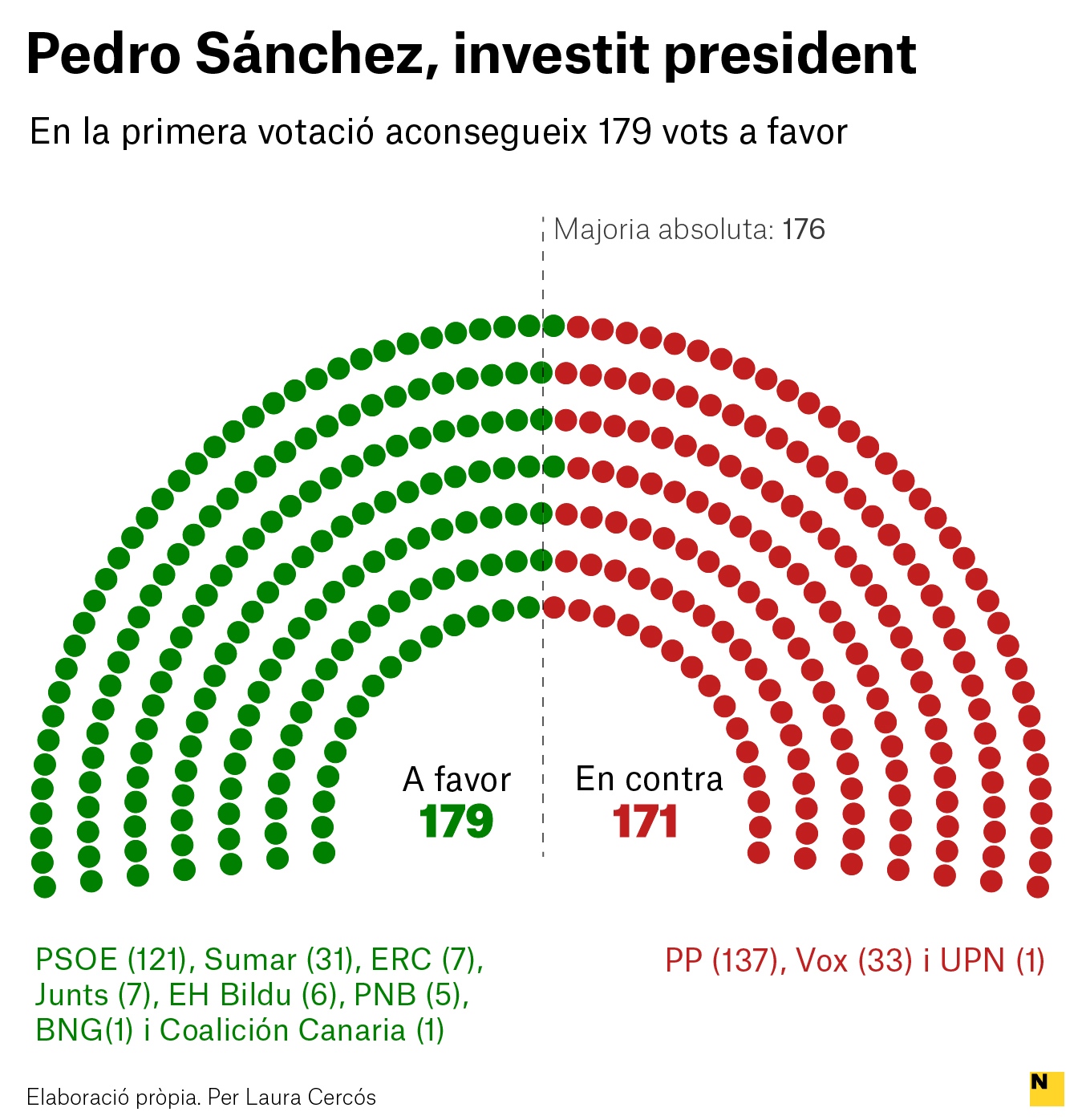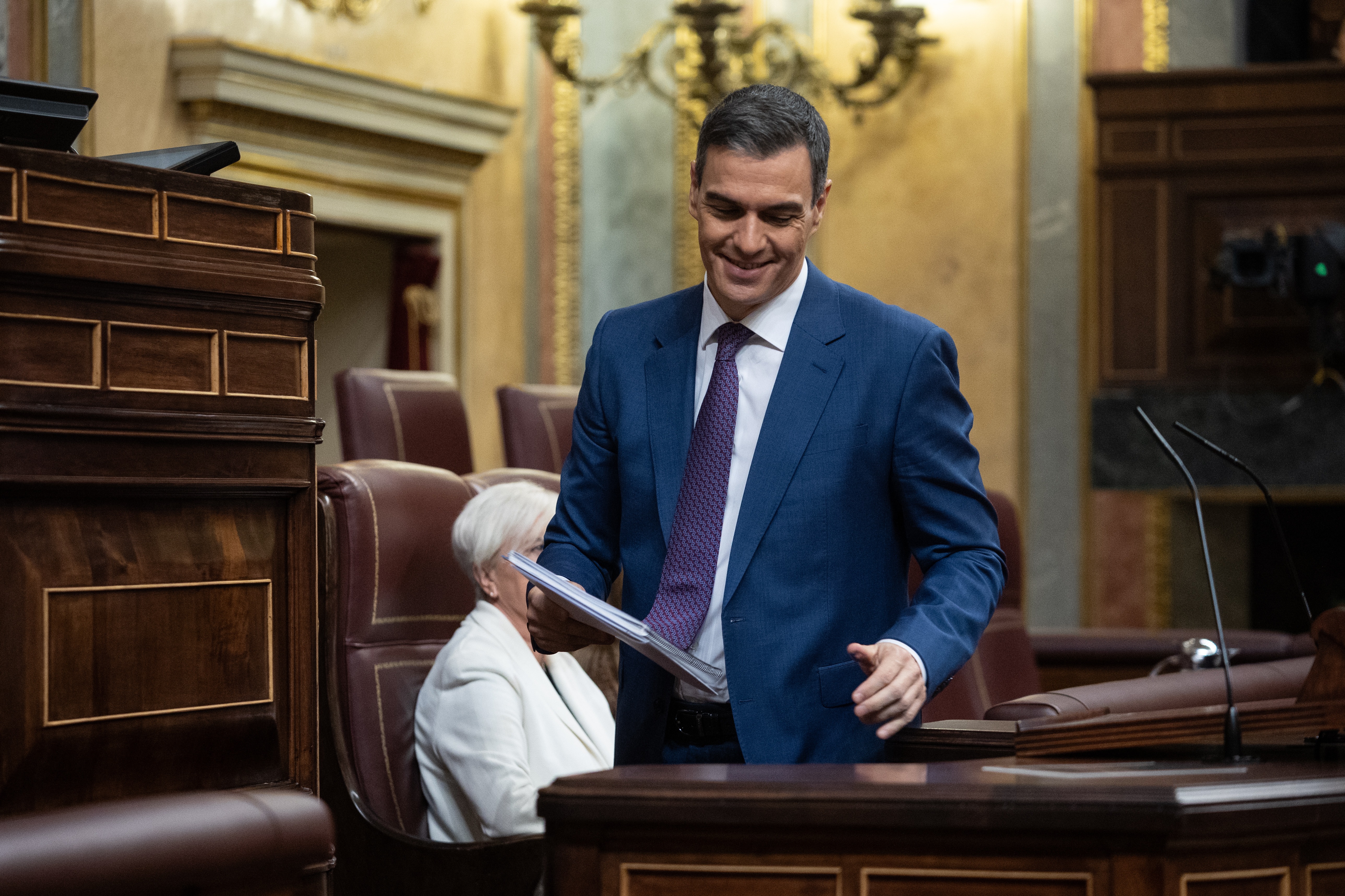The acting Spanish prime minister and the PSOE (Socialist) candidate for re-election, Pedro Sánchez, has been returned to the post this Thursday after MPs voted 179 in favour and 171 against. This is the third time that Pedro Sánchez has been elected as Spanish PM and the fifth time that he has presented himself for investiture before the Spanish Congress. As foreseen, Sánchez obtained the votes of the PSOE (121), left-wing Sumar (31), Catalan pro-independence parties ERC (7) and Junts (7), Basque pro-independence party Bildu (6) and nationalists PNV (6), the Galician nationalists BNG (1) and the Canary Islands coalition CC (1). The bloc of the right - the People's Party (PP) (137), far-right Vox (33) and the Navarra party UPN - (1) voted against him. Sánchez has been able, on this occasion, to add the votes of the deputies from Junts (Together for Catalonia) following the political pact negotiated between the PSOE and Junts that includes an amnesty for all those prosecuted for Catalan independence process actions between 2012 and 2023, the legislative bill for which was registered on Monday in Congress by the PSOE.

The Socialist leader has won his absolute majority of votes after an investiture debate this Wednesday and Thursday that was characterized by the warnings by Junts to the PSOE, by the dialectical clash between Sánchez and the PP's Feijóo, by the false alarm raised over far-right demonstrations outside Congress, and the boiling over of tension seen in the more extremist intonation used by Alberto Núñez Feijóo and the "son of a bitch" insult from Isabel Díaz Ayuso to Sánchez. Now begins a new round of political speculation as Pedro Sánchez chooses his cabinet, which will probably be appointed next Monday.
The investiture of the amnesty
Pedro Sánchez took almost an hour and a half to pronounce the most awaited word of all: amnesty. And he did well if his intention was to get people to pay attention to the first part of his inauguration speech, in which he included some economic-related announcements. When he finally decided to talk about his pact with Junts and ERC, the president of the Spanish government referred to it as a way to "overcome the rift of the 2017 Catalan referendum".
In justifying it, he recalled that José María Aznar's PP pardoned 16 members of the 1980s paramilitary group Terra Lliure after the right-wing leader's agreements with Jordi Pujol's Catalan party Convergència. "Now people are complying with the Constitution in all territories", the Socialist leader added, to justify his depiction of the amnesty as another step in the pacification and deflation of the political conflict between Catalonia and Spain.
Pedro Sánchez report card in Spanish investiture votes: twice unsuccessful (June 2016 and July 2019), and three times successful (the 2018 no-confidence vote against Mariano Rajoy, the second-ballot vote in January 2020 and today's vote)
Sánchez sells himself as the bulwark against the far-right
Much of Pedro Sánchez's speech this Wednesday - as well as that of the spokesperson of his parliamentary group, Patxi López, this Thursday - consisted of positioning the PSOE as the only alternative to the aggressive right-wing tension that has turned the streets of central Madrid into a battlefield between neo-Nazis and police for almost two weeks. Police used batons again on Calle Ferraz this Wednesday, on the night between the two parts of this investiture debate.
Feijóo went so far as to accuse Pedro Sánchez of "fraud" and "political corruption" for pushing through an amnesty law that was not in the PSOE electoral programme. The PP leader pleaded more than once to the acting Spanish PM to dissolve the lower house and call new elections. It was all the ammunition the Socialist leader needed to mock Feijóo once it was his turn to go up to the podium.
Sánchez laughed out loud at the leader of the opposition, after Feijóo's comment that he was not Spanish prime minister "because he didn't want to be" - in reference to not accepting the demands of Junts. "You are the first Spaniard to give up being leader of the government when you can be", said Sánchez between laughs.
Warning from Junts: "Don't push your luck"
The differences between the PSOE and Together for Catalonia regarding their agreement were confirmed this Wednesday and stood out in the first act of the investiture debate, in addition to highlighting the dependence that Pedro Sánchez will have from now on the party of exiled Catalan president Carles Puigdemont. In Sánchez's first speech, the leader of the PSOE asserted that the amnesty law will be "a pardon" for independence supporters, and not the recognition that the Spanish state has acted repressively against a democratic political movement. "You have not been brave", Míriam Nogueras scolded him, late on Wednesday.
"Don't try to push your luck because it won't work," Nogueras warned Sánchez. The leader of Junts in Madrid recalled some of the key points of the agreement between the PSOE and Junts, and underlined that the amnesty "is not a measure of grace" but a move to "dejudicialise politics". Sánchez's initial speech generated a lot of irritation in Junts, but the issue was resolved with a meeting between Nogueras and Santos Cerdán, number three of the PSOE.

